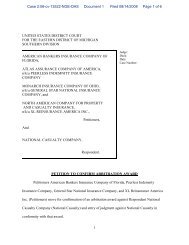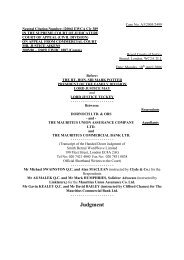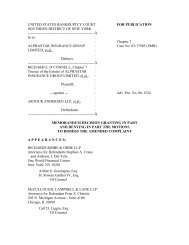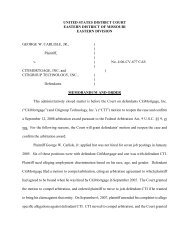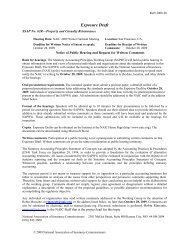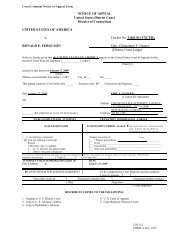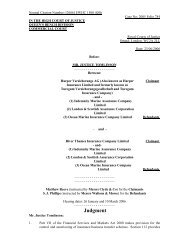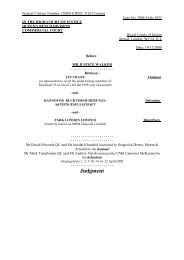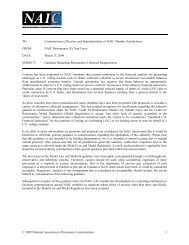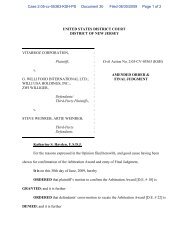Judgment - Reinsurance Focus
Judgment - Reinsurance Focus
Judgment - Reinsurance Focus
Create successful ePaper yourself
Turn your PDF publications into a flip-book with our unique Google optimized e-Paper software.
contract itself, or the circumstances surrounding the contract,<br />
may show that the agent is the true and only principal.”<br />
17.<br />
In the present case Sea Trucks and CPL were authorised to obtain builders' all risks insurance<br />
on the vessel on behalf of Sembawang and at all material times they both intended to<br />
include Sembawang as a co-assured under the policy. The placing brokers, NMB,<br />
were not aware that Sembawang was to be included as a co-assured and did not intend<br />
that it should be a party to the contract, but, since NMB was merely acting as an agent<br />
to place the insurance, that is not sufficient to prevent Sembawang from enforcing the<br />
contract as an undisclosed principal. What matters for that purpose is the authority<br />
and intention of the person in whose name the contract is made: see Small v United<br />
Kingdom Marine Mutual Insurance Association [1897] 2 Q.B. 42. In these<br />
circumstances the argument was mainly directed to whether the terms of the contract<br />
or the circumstances surrounding it were such as to make it clear that the insurers<br />
were willing to contract only with the person or persons identified as the assureds in<br />
the slip.<br />
The mere identification, whether by name or description, of certain persons as assureds<br />
cannot be sufficient of itself to demonstrate an unwillingness on the part of the insurer<br />
to contract with any other person. If it were otherwise, the principles under discussion<br />
would have no application at all to contracts of insurance. Each case must therefore<br />
be decided by reference to the terms of the contract under consideration and the<br />
circumstances in which it came to be made, though no doubt due regard should be had<br />
to the warning of Lord Lloyd in Siu Yin Kwan v Eastern Insurance Co. Ltd that if the<br />
courts are too ready to construe written contracts as contradicting the right of an<br />
undisclosed principal to intervene it would go far to destroy the beneficial assumption<br />
in commercial cases to which Diplock L.J. referred in Teheran-Europe Co. Ltd v S. T.<br />
Belton (Tractors) Ltd.<br />
Cooke J. considered that the present case was one in which it could properly be said that the<br />
terms of the policy prevented Sembawang from taking the benefit of it as an<br />
undisclosed principal. He put the matter in this way in paragraph 64 of his judgment:<br />
“The insurance was drafted to cover the interest of the Sea<br />
Trucks Group, together with any joint ventures into which the<br />
members of that Group might enter, as the terms of the Assured<br />
clause show. That was the express limitation given to the<br />
Assured and I have found that the wording in the Conditions of<br />
the Slip Policy do not have the effect of extending the<br />
definition of the Assured, save insofar as the insurers agreed to<br />
take into account derivative interests and further Assureds who<br />
fell into the same categories as those in the Assured clause.<br />
The failure to include Sembawang, whether by name, or by<br />
including a category of “builders/outfitters” in a policy which<br />
was designed to cover the ship during the period of outfitting<br />
is, as I have already found, highly significant. If there was no<br />
intention to cover Sembawang directly in the policy, it appears


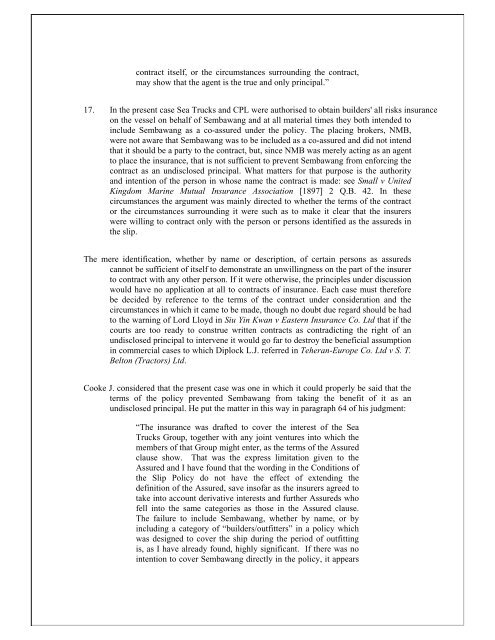
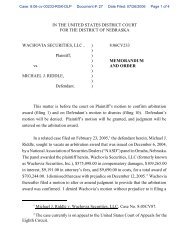
![202 Folio No 734 Neutral Citation Number: [2006] EWHC 1345 (QB ...](https://img.yumpu.com/50015000/1/184x260/202-folio-no-734-neutral-citation-number-2006-ewhc-1345-qb-.jpg?quality=85)
